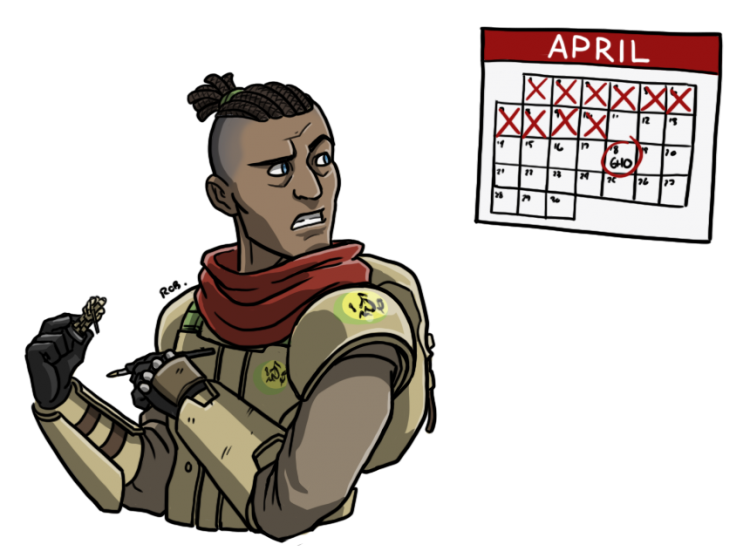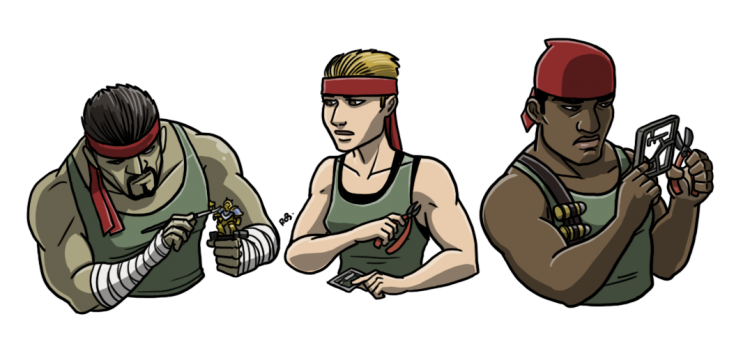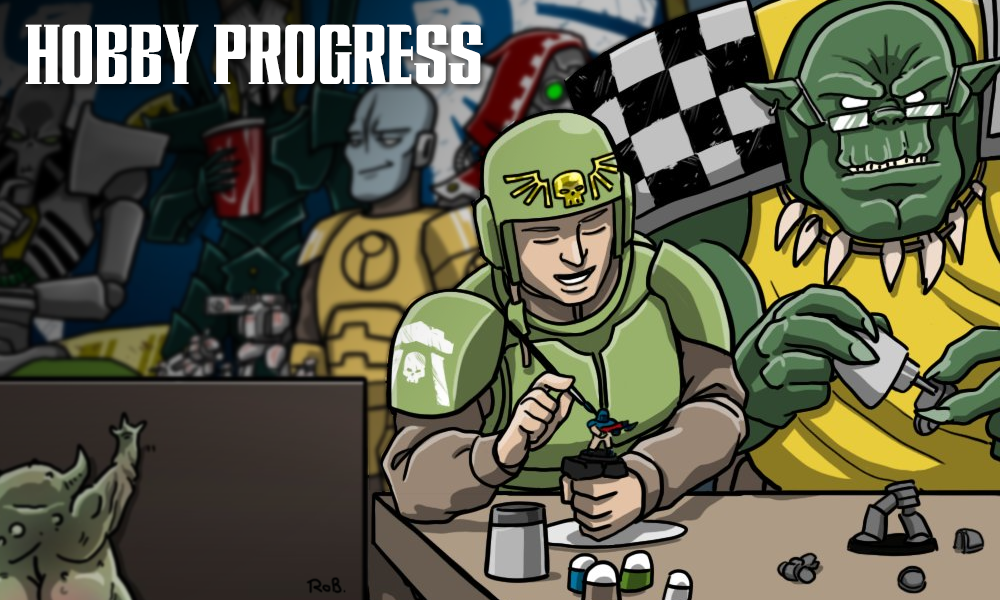One of the biggest problems with having an invisible disability is that sometimes when you talk about your difficulties, people assume you’re being hyperbolic about your experiences. Especially when you live with something like ADHD like I do, it’s very easy for there to be a lot of confusion when you express yourself about your difficulties. When I tell people “I can’t focus on a project and I end up collecting a random scatter of models and rules”, often they laugh and say that’s true for them too. But most people don’t have World War 2 miniatures in three different scales, none of them being complete collections that you can actually play a game with. Most people don’t forget they have entire armies on sprue.
Then there’s the flip side of that – my hyperfocus can be so intense sometimes I’ve sat and painted at my desk in a single position for literally an entire day, until I’m crying in pain, because I can’t break that. My disability isn’t what most people experience when they say they struggle to keep up on a specific project.
That doesn’t mean there aren’t parallels and that’s important to recognise. When I tell people “I can’t keep my focus on a project”, it isn’t that they’re wrong that they struggle with that too, it’s just the extent to which they do. Ultimately my struggle with keeping on track with what I want to achieve is the same struggle they’re experiencing, it’s just the height of our hurdles are different.
Why am I telling you this? Well, because I’ve spent the last 35 years of my life desperately scrambling to find a set of techniques to help me get through, focus, and achieve what I want. Some of how I cope is with what you might expect – medication, support from professionals, and the rest. A lot of it is day to day techniques and tricks to help me keep my mind going back to the same thing, so I do occasionally finish projects and achieve what I want. Do I always manage that? Absolutely not, but I do have a wealth of techniques I used to make it more likely, and over the years I’ve come to realise that most people can get some benefit out of these tricks. Keeping your focus and making it over those hobby hurdles is something we all struggle with, and I hope that the ideas I outline here can help everyone get to the finish line on their dream projects.

Lines in the Sand
This is one way that a lot of the writers at Goonhammer get their projects completed: deadlines. When we’re working on a project for an article, we try and make sure we have deadlines set in advance, so the work has to be done or the Editors yell at us (or look very disappointed, which is honestly much worse). That really helps us, but it’s not the only way we create deadlines for ourselves. I rely on deadlines to drive myself through projects, especially in the second half when I’m struggling to get my ducks in a row.
Tournaments or events are a great way of pushing yourself to complete a project. I’ve definitely finished armies because I’ve signed up for an event with a minimum painting standard, and then realised that I’ve actually got to finish the damn thing, even if that’s desperately the night before. We’re given a lot of flack in our lives for cramming tasks in at the last moment (and it’s hardly ideal), but if that’s the difference between it happening or not I’ll take the 3am crunch time.
In our current world, big public events are probably not on the table. So what can we do? Well, if you’re lucky enough to be in a country where you can meet up with friends and play games, then organise with someone to play a game, agree that you’ll use your (as yet unfinished army), and set that as a hard deadline. If possible, pick a friend who’s a jerk about unpainted minis (we’ve all got them, might as well put them to use).
If you’re not quite so purely motivated by fear and the adrenaline of social consequences, just setting a deadline for yourself can be handy. Put some dates in your diary or calendar to mark where you want to be with your project by certain points, and do your damndest to hit them. You might be surprised how motivating even an arbitrary deadline is to getting stuff done. It can sometimes help to promise yourself rewards too – if I hit this deadline I can buy this thing. I don’t have the self control for this, but I’m told it works for other people.
If you’re really, really struggling you can go all in: death or glory. I have only done this once, but it did result in a painted army. I don’t know if I can recommend it. Here’s the technique: I told my husband that if I hadn’t finished painting this army by a certain date, he should take it and throw it away.
The fear this instilled in me was palpable. Of course, you need a willing individual who will stare you in the eye, tell you you’ve failed, drop your minis in the bin while you watch, and who you love enough that you can forgive them afterwards, but holy shit does that motivate you. Only the bravest need apply.
Strength in Numbers
Another fantastic way to keep yourself going is through peer pressure. I love group projects because they force me to keep up my end of the deal, and my deep rooted guilt won’t let myself be the person who screws up a joint effort. If you want to get into a game, or finish an army, finding a group of friends (local or online) who want to do something similar and doing it together can be a huge boost. Make it a thing where you check in and talk about your projects, post up your progress each time you make some, give each other encouragement and generally make it a really supportive atmosphere. Small groups tend to be best for this – 4 or 5 people seems perfect in my experience. Even better, combine it with a deadline of having a meet up and a big game.
You can also combine it in a different way. You may have seen the Tale of x Warlords series that runs on Warhammer Community and in various other places. This is a great way of getting a group dynamic going that also has deadlines set up – complete x units each month, until you all have an army each and can play together. You can do this in different ways to fit the focus and goals of your group – maybe if you all want to play a skirmish game, a goal of one or two minis a week could keep you going.
One thing that’s important is to find people who are working at roughly the same pace as you. If you have one person who is racing ahead of everyone else, and someone who is barely getting anything done, soon the group dynamic of everyone encouraging each other becomes fractured. People can find falling behind demotivating, or not have the push to continue because other people aren’t doing as much as them. So finding that group that moves at the same pace as you is essential.

Change of Scenery
Sometimes getting over a hurdle is about finding another way to tackle it and a change is as good as a rest. Of course, the downside is, this is part of why I own so many different projects.
That said, if you can resist the lure of just constantly changing your projects up having some different things to rotate in and out can be a great way of helping you finish things up. If you find that your attention or focus is flagging on something, then having a break and doing something else in the hobby can be great. I find that this works best when you have 2 or maybe 3 at most projects on the go, each of which is very different in tone and style. I try and have:
- A more substantial game with units of minis I know I’ll struggle to keep focus on
- A skirmish game where each mini is a project of its own
- A terrain/scenery project that I can do kind of mindlessly when I can’t do anything else
This works well for me. I work on the main game and when I’m flagging, I take a break and paint a mini from the skirmish game. Because the skirmish game has so few minis needed to play, and because each mini is a sort of mini project of its own but a very short one, I can do something a bit different and then go back to the ‘main’ thing. If I find myself at my desk but without the will to do anything in particular or the patience to paint anything detailed, then I’ll pick up my terrain project, stick on a movie or something I knew pretty well but find entertaining, and blast through drybrushing ruins or whatever. This really helps keep momentum going on your projects, lets you mix things up, and stops you getting stuck. Even better, I often find skills I pick up in one project help me solve problems I was having in another, so it generally improves your ability to get stuff done.
Being Honest With Yourself
OK, this one is hard, I won’t lie. One of the hardest things to crack, but one of the most impactful if you do, is being honest with your hobby aspirations and your actual will to achieve them. For example, I absolutely love the idea of a 28mm scale mass battle game. I own several armies for games like this. I have finished painting none of them. If I am being honest with myself, the chances I will are basically nil.
I know lots of people with fully painted 28mm mass battle armies. I don’t think I’ll ever be one of them. That’s just not realistic given my attention span, what I enjoy in hobbying, and what time I have to give to any one project. I love gaming with big armies, but painting them at 28mm just isn’t going to happen, and I need to be honest with myself about that. When I realised this, I started collecting mass battle games only at smaller scales, which are faster to paint. I reserve 28mm for skirmish games. Mostly. I have bought a mass battle army at 28mm since I made this decision. Nobody’s perfect.
Being honest with yourself also means sometimes brainstorming your way around problems. You’ll never actually get a Space Marine army finished because try as you might, you just hate painting Space Marines? Pick up an army secondhand that’s already painted. If you’ve got the money, there are plenty of people out there who want the work painting on commission. Sometimes it means playing games at a scale you hadn’t considered – maybe if you can’t cope with painting the huge armies at 28mm that Apocalypse demands you can find some Epic stuff secondhand and play it at 6mm. Maybe if you don’t actually like painting more than a dozen minis from a single faction you can play AoS, but you need to carefully pick your army so you don’t end up painting more than a few models with the same aesthetic.
Sometimes being honest with yourself means being happy with what you paint, even if you never “finish” a project. If you buy a box and you paint half of it, but you really loved painting that half and you didn’t really have a plan for them anyway… have you failed? Hell no. You painted cool minis, you had fun, and you’ve got something great to show off. Look at other ways you can use those minis if you still want to play with them – check out indie games that only use a handful of minis, or play something like Kill Team or Warcry.
Being honest with yourself also means recognising when a hobby hurdle is a hobby wall. Sometimes we just have projects that we want to finish, that intellectually we know we should be able to finish, but we just… can’t. It’s not always explicable, but that doesn’t matter. Since I was a kid I’ve dreamed about having an army of ancient Greeks, hoplites in phalanxes, round shields at the shoulder, long spears. It’s genuinely been one of my lasting ambitions in the hobby. I have tried six times to paint an army of them. In theory they should be great – there are lovely minis. I’ve sensibly picked skirmish games so I don’t have too many to finish. I love painting skin and cloth, which is 90% of them. I found a great bronze recipe I really liked. I even, the masochist I am, enjoy freehanding shields.
It turns out I hate painting Greek Hoplites. I don’t know why, but I absolutely detest it. I can’t find it fun and I need to be honest with myself that no matter how many times I hurl myself at it, this wall isn’t a hurdle.
Stepping Away
Another important thing to remember is when to just step away from doing hobby stuff entirely. It’s not healthy for our lives to be focused purely on one thing, we need other stuff going on. If you find yourself thinking about getting hobby work done and it just fills you with dread, or you feel listless and exhausted, just… step away for bit. There’s no obligation to do this hobby, it’s supposed to be fun. If you’re not finding it fun, then hey, maybe it’s time to tune out and do something else for a bit. Take a walk, cook a meal, spend time with friends and family, indulge in another hobby for a while. Even a few nights just slumped in front of some cool new Netflix series can be the break you need to find your enthusiasm again.
Knowing when you need a break or change is vital to avoid burning out completely and losing that love for the hobby that you have. It’s better to paint a night or two a week, or have a few months away, than to end up trying to push through for some imagined need only to find you’ve fallen out of love completely with your pastime. Giving yourself space to enjoy it is really important. That also means not measuring your buy-in against others. Some of my fellow writers are really keen competitive players and they love it. I’m happy for them, but that’s not me and I shouldn’t try to make it me. I don’t have anything to prove and neither do you: just do the hobby you want to do, and you’ll find a lot of those hobby hurdles are really just breathing spaces where you can do other things that are just as fun, in the hobby or without.
And if you don’t? Well, then maybe it’s not a hobby hurdle, maybe it’s a stop sign. That’s OK too – plenty of us have points in our life where our hobby doesn’t seem as important or fulfilling to us, and cultivating other interests is fair enough. Taking a break away doesn’t have to be forever, but it also can be. That doesn’t mean any of the time we spent doing this thing we love was wasted. Any time where you have fun, where you were satisfied, is worthwhile. There’s not winning or losing as long as you’re enjoying yourself, because that’s why we do this in the first place.
Have you encountered any hobby hurdles, due to a disability or otherwise, and think we should know about it? Got other great ideas for helping get over those hurdles? Let us know by emailing us at contact@goonhammer.com.


